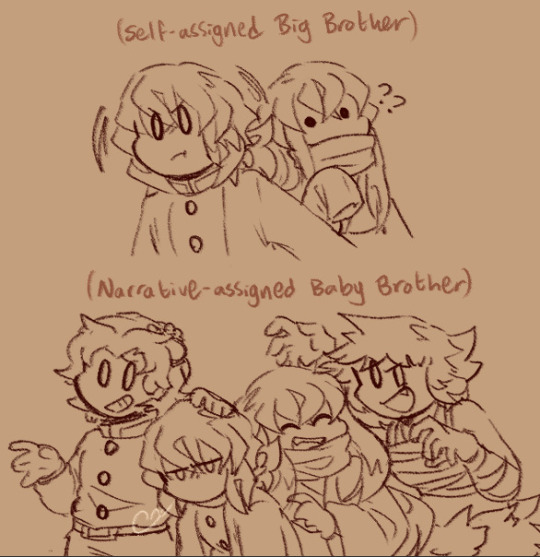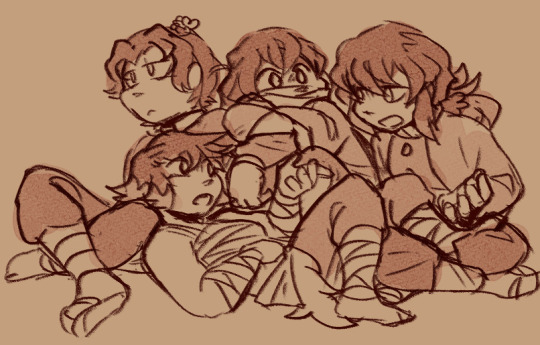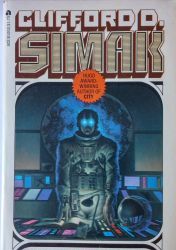#<== new tag for whenever i inevitably infodump again
Text


I Am So Glad You Asked!!!
So basically... Tokitoswap! a swap au in which the tokis and the kamados swap roles-- yui swapping w/ tan, and mui swapping with nezzy.
aka: Two Twins Have A Bit Of A Worse Time Than Usual And Suddenly Find Themselves In The Middle Of A Thousand Year Struggle Between Humans And Demons (Which Are Real By The Way)!
. it also happens to be an exercize in having a concept, going “hey, wouldnt it be funny if--?” and then it sticks and you have to commit. i keep trying to explain in a way that Makes Sense, but im gonna be honest. theres just So Fucking Much going on and ive been trying to write this for hours and i dont even know where to start summarizing WAHAHAH. i dont know if its very Canon Aligned but it sure is very Me Aligned and i sure am gonna commit to the bit! anyway.
its heavily in-progress and was supposed to be a clean one-role swap but! Well!!!! It Sure Isn’t Anymore!!!
under the cut since im Incapable of keeping things short:

funy lil swap au! ft:
Yui: “Older” Brother who Thinks he’s in charge. a beleaguered 14-year-old who stumbled into being a slayer and super isn’t prepared for this. Unfortunately, having your sole remaining family turn into a demon is kind of antithetical to “go home and pretend nothing happened.” he is handling this very well. (lie)
a user of wind-breathing, his main priority is keeping him and mui safe, and is a bit overprotective. which is a problem, since mui will charge headfirst into the first sign of danger to protect him. their relationship is a bit messy, but they’re pretty much the only thing holding each other together. a kid trying so hard to act bigger than he is-- and inevitably, routinely failing.
Mui: Odd Little Creacher secretly hiding Rage More Powerful Than A Thousand Suns. just barely surviving the attack of their family one fateful night by That Man, he manages to completely break the curse and hunger or being a demon through his own sheer will. unfortunately, he also completely loses control of himself and, in order to make sure that energy doesnt completely tear him apart, his consciousness completely mists over-- leaving him rather airheaded and distant in an attempt to hold back the roaring of a new power he cannot control. . but hes so silly!! ^w^ couldn’t hurt a fly!!
Murata: Some Fucking Guy who just so happened to get roped into all this. is just absolutely baffled this kid is out here slaying demons like this, and is honestly doing his best to make sure he doesn’t stupidly get himself killed. despite being at a higher rank than them, though, he’s kind of... well, he hasn’t gotten the hang of water-breathing techniques. try as he might, he just cant quite reach the same skill level as some of his peers. even still though, he has to keep trying. he has a job to do, and promises to keep.
Susamaru: Professionally identifies as a Problem. a user of beast-breathing, she just kind of... shows up one day and starts antagonizing. originally started fighting the twins for the honestly-kind-of-reasonable reason of “That Kid Is A Demon And Thats A Fucking Problem” but got distracted messing with yui enough to get. kinda curious about the other one. she’s loud and brash and fucking annoying, but at some point she just... asserted herself. and never left.
she’s an odd case. ridiculously skilled at the whole slaying-demons thing, she just... doesnt seem to take things seriously. has a penchant for irritating people on purpose-- but its purely for the extent of understanding how they work. what makes them tick. she’s here for a good time, not a long time. most of her peers don’t like her much, but once she’s decided that she likes someone, theres very little she wont do for them. and these nerds just so happen to be next on the list.
. all in all, its just these dorks against the world. there’s just. a ridiculous amount of mess ive written about how they function and how their arcs shape up, and while there Are some other roles and etc written up, my brain has been completely laser focused on These Four In Particular, so . \o/ ! anyway, heres a bunch of ambient sketches from all over the place of Them(tm)




#pikramble#<== new tag for whenever i inevitably infodump again#ANYWAY IM BEING SO SERIOUS WHEN I SAY its been MONTHS.#like. i started in like september last year and its just. theyre most of what ive been thinking abt!!!#POLITELY ALSO gonna. ask for no rbs on this post specifically. not that i can stop u#JUST BC this isnt like. a very easily presentable au and also im very nervous all th time n if this breaches containment ill explode. ty <3#this is for me adn th handful of th rest of u listening 2 me during this sleepover.#but like. this isnt even the most of it besties.#i havent even gotten into yui's weird thing with Fate or susa's thing with Conflict#or mui's struggle with what it means to be a demon; what it means to have autonomy; what makes you You.#or mura's self-discovery or their weird; patchworked sibling bond or what it means to experience loss and the nature of Moving Forward#not even mentioning nezzy's whole deal or whatever the Fuck is wrong with kai this time or!!!! AUHG#lichrally will answer any questions but this took me hours bc i kept getting nervous WAHAHAH#all this to say: i spent months thinking abt an au and accidentally made what might as well be weird fuckig ocs. thankyou <33#dont expect any of it to be like... too canon compliant; things r a mess but i care too much to bother w staying in line w it!!!#anyway u WILL see these guys every so often. whether au-wise or oc-wise. if u see any suspiciously familiar ocs from me No U Dont(tm)
14 notes
·
View notes
Text
Review: Clifford D. Simak, “Time and Again”

For almost a decade, my father and I have been playing this game where he recommends me an amazing piece of pulpy retro sf and then, caught in the rush of work and the vicissitudes of life, it takes me about two years to read it because I only seem to “have time” during holidays and breaks. The first was The Space Merchants (1953), a brilliant, biting novel co-written by the inimitable duo of Frederik Pohl and C.M. Kornbluth which was brutally satirizing 1950s advertising and consumer culture way before Mad Men made it cool. Issued mid-high school, I managed to squeeze it in between my senior year AP exams and the start of my post-graduation summer job. The second was Gateway (1977), also penned by Pohl, whose dual story threads tracked a dangerous Russian roulette-like space exploration program and the psychotherapy sessions of a traumatized former explorer. With an original loan date in the summer just before I left for my junior year study abroad, fate eventually intervened and put it on the syllabus to a class I was taking… in my first semester of graduate school. The latest was Clifford D. Simak’s Time and Again (1951), which, after the customary two years gathering dust beside my books for work, I finally managed to finish when a bomb cyclone and ensuing polar vortex shut down life in the Northeast US as we know it.
To the untrained (read: ungenerous) eye, Time and Again is a typical 50s sf yarn with a mystery premise like something out of Jonathan Creek. Twenty years ago, burly white male protagonist du jour Asher Sutton was sent to recon a mysterious planet. In the present, with no warning or explanation, Sutton’s ship returns to Earth, battered beyond repair but still somehow flying. Based on calculations by the boys in the lab, there’s no scientifically explicable way Sutton could have survived the destruction of the ship and the trip back to Earth. So how, asks the dust jacket, is he back, seemingly alive and well? It’s the kind of question entirely typical of sf at this time – how did our intrepid Campbell-esque engineer hero MacGyver his way out of certain death using only his wits and good old science? It, in turn, begs the kind of answer you’d have to animatedly diagram on a napkin while babbling about mirrors and ricochet effects and tricks of the light.
And yet Time and Again almost immediately undercuts this mystery when it admits the answer practically on the first page: Sutton didn’t survive. He died, and a mystical force – a secondary being tagging along in his consciousness that Sutton nicknames “Johnny” – is responsible for bringing him back from the dead. Thrust suddenly into a world where inexplicable Powers That Be can do everything from read and influence the thoughts of others to reverse death and travel through time, Sutton find himself an engineer in a world where science and deductive reasoning counts for very little anymore. In fact, every time Sutton thinks he’s figured something out and acts decisively based on that logic, he’s smacked mockingly in the face by the unreality of his situation. Bouncing from incorrect supposition to incorrect supposition, trying to piece together a complex time-travel paradox in between being drugged, knocked out, beaten up, shot, and even killed a few times, Sutton is an early sf protagonist deeply disenfranchised and wholly at the mercy of the plot.
This, believe it or not, feeds into the central focus of the novel, which is destiny. In Time and Again’s 74th century, capital-m Mankind is very much on the back foot and trying to get back on the front foot by following a twisted version of manifest destiny and colonizing the whole universe. But with so few actual Men left and so many stars yet to conquer, Man has no choice but to create “androids” (not robots, deceptively, but clones) to artificially swell his numbers and provide better universe coverage. Treated like second-class citizens, the beleaguered androids are now making a subtle bid for abolition and legitimacy. What does all this have to do with Sutton, you ask? From his trip to the mysterious planet, Sutton draws a profound epiphany about destiny – that every living thing has a destiny and striking a balance between accepting and questioning one’s destiny is the true route to happiness. Returning to Earth, Sutton plans to write the self-help book to end all self-help books espousing this philosophy of destiny. From clues and individuals sent back in time from the future, Sutton realizes his book has become the ultimate hit – it’s started a war between a faction of android rights activists holding it up as a doctrine of equality and a cadre of Men dead-set on annotating the hell out of it in a Revised edition that reaffirms manly Men’s supremacy. In the middle of it all is Sutton, who in the present day is forced to dodge deadly assassins and seriously pushy book agents alike despite the fact he hasn’t even written the book yet.
Like the twist answer to the dust jacket question, this dilemma of the future war and the book’s effect on it has a sort of swerve ending that I love. Without giving away too much, I’d say Time and Again above all preaches the long game – evolution, not revolution. While the lot of androids is pretty bleak in the novel’s present, Sutton’s doctrine of destiny for all living things – both born and created – promises to significantly influence the thought of the universe in favor of equality and understanding. But, as controversial and dangerous as the book seems to its enemies and naysayers, that’s all it is – a sizeable drop and ensuing ripples in a steadily gathering pool of sentiment which will one day overflow its container. And while this kind of slow progress towards a distant goal of understanding can be frustrating and disheartening in its slowness, Time and Again at least offers the comforting inevitability that the arc of the universe bends towards justice, which is relatively refreshing compared to the “we’re all doomed and that’s all she wrote” noble pessimism of so much contemporary sf.
Aside from the unexpected flouting of Occam’s Razor in the book’s initial mystery, the novel’s most left-field aspect is its deep reverence for untampered nature, glimpsed on Sutton’s visits to the distant past of his ancestors living in scenic Bridgeport, Wisconsin. Having grown up on an Earth so relentlessly manicured it’s like something out of Marvell’s mower poems, Sutton joins in with the mower in mourning the fact that everything about the planet, from the landscape to the weather, seems rustic and hardy but is in fact precisely controlled, and not one thing on the planet is for industry rather than pleasure. Disagreeing with Man’s addiction to pleasure and ease of life as much as their perverse doctrine of manifest destiny, Sutton appreciates the pastoral pleasures of farm life and hard work, waxing poetic about them for paragraphs at a time:
There were times when the work, not only for its sedative effect but for its very self, became a thing of interest and of satisfaction. The straight line of new-set fence posts became a minor triumph when one glanced back along their length. The harvest field, with its dust upon one’s hoes and its smell of sun on golden straw and the clacking of a binder as it went its rounds, became a full-breasted symbolism of plenty and contentment. And there were moments when the pink blush of apple blossoms shining through the silver rain of spring became a wild and pagan paean of the resurrection of the earth from the frosts of winter. For six days a man would labor and not have time to think; on the seventh day he rested and braced himself for the loneliness and the thoughts of desperation that idleness would bring. (226-227)
Time and Again has of course got some problems, especially problems reminiscent of its distant ancestors – for example, a Blade-Runner-esque female character who initially seems powerful, well-informed, and key to the plot, but whose role, after infodumping all her expertise onto the male protagonist, devolves into merely pining for him. And for a novel which hangs its central premise on a text preaching the equality and oneness of all things, Asher Sutton playing human savior to the novel’s disenfranchised Other seems a contradictory misstep at important moments. Only the fact that Sutton, himself now something more/less/Other than human, is bumbling and utterly clueless, being dragged along by fate, manipulated by a vast network of spies, and punished whenever he thinks he’s got things figured out, keeps him from devolving into the self-righteous figure who thinks he knows the lot of the suffering better than those suffering themselves. As a result, Time and Again comes off as a subversive, self-deprecating, oddball 1950s pulp constantly toeing the line between having big brilliant ideas and overreaching.
0 notes